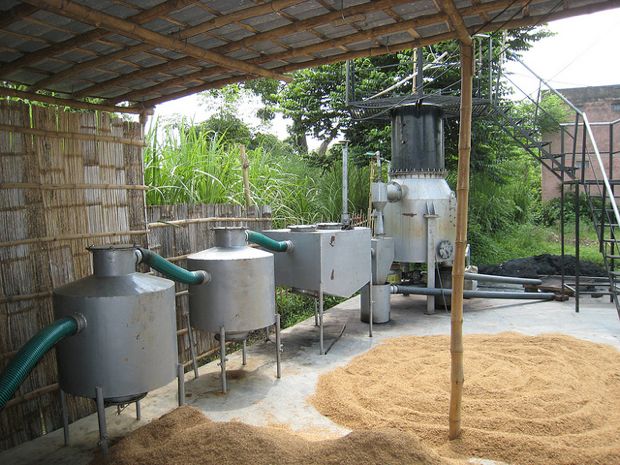 In countries where rice is the staple form of carbohydrate a vast quantity of rice husks are discarded. But what if these husks could be turned into something useful? Electricity perhaps?
In countries where rice is the staple form of carbohydrate a vast quantity of rice husks are discarded. But what if these husks could be turned into something useful? Electricity perhaps?
Well actually, in India and Cambodia, that’s already the case.
Husk Power Systems in India, was started four years ago, with the idea that the plants should be so simply run that anyone can do it.
With investments from the Shell Foundation, amongst others, there are already 60 plants across India, serving 150,000 people and plans for a Husk Power University and international franchising.
The obvious advantage of the systems is that they use material that would otherwise go to waste in order to produce desperately needed electricity but also it means electricity can be brought to difficult parts of India where the national grid does not reach.
Similarly, Cambodia Angkor Kasekam Roongroeung (AKR) is about to launch its husk-powered generator this year.
Electricity from the generator will be used to process rice and double the company’s rice exports as a result.
Excess electricity will be sold to local villagers for less than what they’d pay for electricity from the national grid. And the idea is catching on quickly too; Golden Rice Cambodia has invested $2 million in a rice-husk electricity plant in order to power local rice mills.
While the natural resources necessary for locally produced power do exist in Cambodia and India the funding for national infrastructure does not. The use of husk power allows cheap electricity to reach homes without relying on expensive and polluting electricity imported from China, Vietnam and Thailand.
(Spotted on Fast Company)

Katherine Hui is currently the Social site editor at Green Thing, a web-based public service in London that inspires people to lead greener lives through creative content.
Before this, she worked as the Development Manager at Social Innovation Camp, an organization that encourages people to use web and mobile-based technology to mobilise social change. She oversaw 300 ideas submission and helped build 20 prototypes – five of which have gone on to get further funding or investment.
Katherine’s came over to the UK form Canada in 2007 for an MSc program at the London School of Economics. Before arriving in London, she managed a small environmental start-up in Vancouver called the Canadian Climate Change Alliance.
Katherine is football mad. She is a loyal supporter of Arsenal FC, plays for Islington Borough Ladies FC and coaches for Gunners in Islington in her spare time. Her second favourite hobby is kite surfing and she can sometimes be found chasing the wind.








